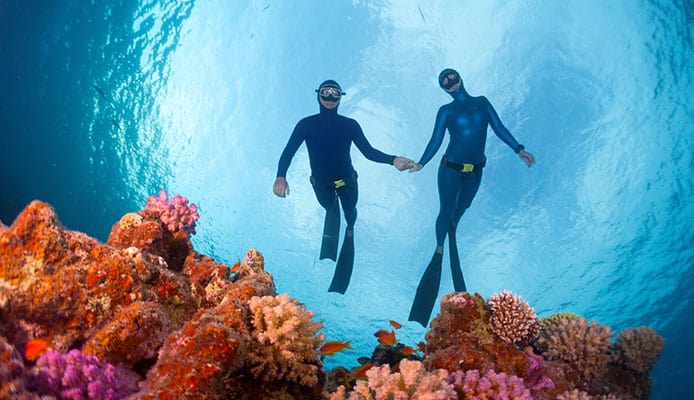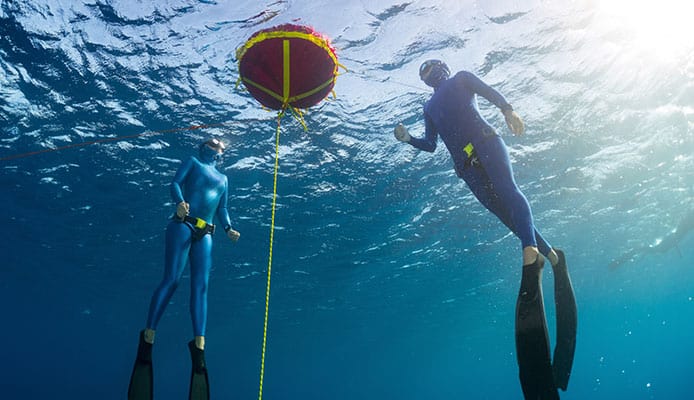
Freediving is a sport that allows you to test your body’s limitations. For people who are competitive in nature, they will find freediving not only challenging but a great way to push the limits and find out just how long they can hold their breath.
However, while it is easy to think freediving is a less complicated sport compared to scuba diving, mainly because there is no use of the scuba diving gear, there are still some serious risks involved. It is thus important to observe freediving safety tips. At the cornerstone of freediving is learning proper freediving breathing techniques to keep you safe.
These are the best freediving breathing techniques that every serious freediver needs to learn.
Get proper training
Before you can learn the different freediving breathing techniques, the most important thing you need to do is to enroll in a freediving course. Deaths from novices who pushed their limits a bit too far are all too real.
And novices are not the only ones in danger. Professional freedivers have also lost their lives. It is paramount that you never free dive without the guidance of a trained professional. This will help you avoid the 5 most common freediving mistakes.
Only afterward can you employ different breathing techniques. These will complement the lessons that you learned during the course.
Taking the plunge
What makes your body gasp for air is not a lack of oxygen. It is actually from the buildup of carbon dioxide in your system from holding the breath for too long.
Many people will easily hold their breath for a minute or two as they fight the urge to breathe. However, for freedivers, training focuses on breathe holding techniques for freediving while becoming even more proficient at ignoring the urge from the rising carbon dioxide levels.
When practicing your breathing techniques, always keep in mind that it is going to take practice to increase the time you can hold your breath.
Start by sitting down and relaxing. Then take a deep breath slowly and gradually over a 5 second period. Hold the breath and then slowly exhale. Repeat this five or six times.
Always ensure you have the best freediving fins before making the dive.
Static apnea
During your freediving breathing practice, enter the pool with your partner and lie flat on the water with your face upwards and out of the water. Your partner will be standing next to you.
Then take a slow deep breath and let your partner roll you over such that your face is now in the water. Hold your breath for as long as you can. Meanwhile, your partner will be tapping you to check whether you are still okay. You can use an outstretched finger to signal that you are indeed okay.
Take a look at how to get the PADI freediver certification.
During this time, you may feel your body begin to tense up as the levels of carbon dioxide begins to rise. Ignore the feeling and relax. Then when you can’t hold you’re breathing much longer, your dive partner will roll you over. Go to the side of the pool and take slow gradual breaths. Avoid taking a huge breath at once. After your breathing and your heart rate go back to normal you can repeat the exercise.
Your partner will be noting down the time after each exercise and slowly you will begin to see your time begin to rise as the body gets used to the high levels of carbon dioxide.
Anaerobic training
You need to include anaerobic training in your freediving workout regimen is if you are going to boost your body’s capacity to stay without oxygen for longer.
This is where you do short bursts of highly intensive activities such as running until your breathing cannot provide enough oxygen to the lungs. As a result, the body is going to start burning glycogen and phosphates to get the energy it requires.
The reason why anaerobic training is so important is that when you are actually free diving, your body is going to require more oxygen faster than if doing static apnea due to the high rate of burning energy.
Among the few important gears to always have is a freediving computer.
How to dive deeper
You need to ensure that your body is in a relaxed state and avoid hyperventilation. You can even close your eyes and think of a calm and happy place just to get you in that state of mind.
Also, check the position you are in right before freediving. This will have a huge effect on the quantity of oxygen that is in your body. You can lie on your back when breathing. This means that your body is not using any energy to maintain an upright position allowing your body to take in as much oxygen as possible.
Other divers will prefer lying on their front when doing their breath-holding techniques for freediving. The most important thing is that you are relaxed and are not expending any energy.
But how long should you spend preparing for your next dive? This will depend on how long ago your last dive was and how well-rested you actually are. If for example, your body is well-rested, you may spend just two minutes preparing for the five.
Right before you make the dive, you want to completely exhale the air from your lungs and then take a deep dive. Always ensure you have the best freediving mask for you.
Humans are very much similar to marine mammals when it comes to diving. We all share the mammalian diving reflex. This is where the body goes through certain reactions to allow it to survive with low oxygen. An example is where blood vessels that are located on the skin constrict preventing the blood from reaching this far and directing it to the vital organs.
You might also like:Avoiding Blackouts And Hypoxic Threshold In Freediving
Rising to the surface
As you rise to the surface, you may feel contractions in the diagram as well as the throat. You should not mistake these as a sign of distress. They are a result of the body asking for oxygen. These are just some of the things that you are going to learn during your freediving training.
It’s important that you learn to ignore such feelings and that you kick slowly and gradually as you rise to the surface. If for example, you were to panic, you may experience a shallow water blackout. This is why freediving training is important as it teaches you to ignore such feelings and to maintain a strong mental state.
If, however you notice that you are beginning to panic, think of puzzles or math problems and try to solve them in your head. They will help distract you from panicking.
When your head is finally out of the water, you may get tempted to take fast regular breaths. However, try and fight the urge and instead breath in slowly and exhale slowly as well. As you breathe in, hold in the breath for a few seconds and then breathe out. This will help your body and mind recover faster and you should feel the dizziness begin to fade.
Freedivers should only make the dive if they have the essential pieces for freediving.
This is called recovery breathing. You must be holding on to some support. It will prevent the airways from going below the water as you breathe. Ensure that you avoid talking during this time. Even while the dive may have been shallow, you must observe proper recovery freediving breathing techniques.
Your dive buddy will keep an eye on you for about 30 seconds after you exit the water. Even while you may seem fine there is still a possibility of something going wrong at his time.
Hyperventilation is to be avoided when freediving. This is when you breathe more than the body requires. An example is your increased rate of breathing when walking compared to when you are sitting down.
Before you free dive, your body experiences heightened levels of carbon dioxide. This causes you to want to breathe. Note that there may be up to 150 times more carbon dioxide inside your blood than in air and it is understandable that your body wants to gasp for air.
By performing breathe holding techniques for freediving you reduce the level of carbon dioxide and this makes your dive much easier. Novice traders tend to think making regular breaths is the same as hyperventilation. However, while it will bring down the carbon dioxide levels, it will also bring down the natural feeling of wanting to breathe during the dive. This will put you at a high risk of experiencing a blackout.
Globo Surf Overview
Freediving might seem simple but there are freediving breathing techniques that a diver needs to master to be able to prevent any serious risks and to push his body as far as he can.
More Scuba Reviews:
- Full Face Scuba Mask
- Scuba Regulator
- Spearfishing Wetsuit
- Dive Light
- Dive Gloves
- Deep-Sea Diving
- 5 Point Descent
- Decompression Sickness
- Free Diving Dangers


